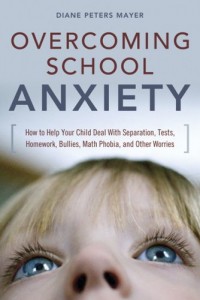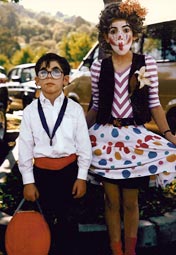|
|
October 30, 2009
 Does this really need a caption? Just pulled a batch of pumpkin muffins out of the oven. Don’t know who put them in there but I’m grateful as all get out! Watching those beauties cooling on the rack, I’m struck by the utter perfection of a muffin. Aromatic. Golden. Round. There’s a cosmic wholeness to each one those puppies.
When Fayette was 3, David and I took her on a weekend outing to Lake Tahoe with another couple and their two little boys. (Important Note: Unless you know people really well and like spending lots of time with them and their kids, or you’re actually looking for a way to end a friendship, do not go on vacation with another family.)
At a pit stop we hit a local bakery. I told my daughter to pick out anything she wanted from the enormous display case. After careful consideration she chose a giant cookie carpeted in rainbow sprinkles. Her eyes shimmered as I handed her the treasure. Holding it tenderly she seemed incredulous that something so beautiful belonged to her.
But before Fayette had a chance to nibble, the other mom (the one we were traveling with not my evil alter-ego) snatched the cookie away saying, “That’s too big for you to eat by yourself. Let’s share it.” Then she snapped it in two and handed half to her son and the other half back to my shell-shocked little girl who instantly erupted in dispair.
The Other Mom shot me one of those looks: “You must be a crappy mom to have such a spoiled brat.”
For the record, Fayette was never a brat. Part of the explanation is her naturally sunny disposition and I can’t take credit for that. The other part I can and will take credit for… the simple fact is that I am a great mom! But I digress.
Back in the bakery I totally got my daughter’s reaction. I almost cried too! In one swell foop, Fay’s perfect, whole treasure was reduced to… a crumbly mess.
We’ve (mostly) forgiven that woman’s misguided attempt to teach kids the joy of sharing. No seriously, she’s forgiven. Really she is!
We suffer a loss when something that ought to be whole is less than whole. As parents we often offer up just part of what we should be giving to our children. I know we’re stretched and stressed. But we still have the ability to deliver the whole. That would be our complete attention when our child wants to show us something (even when you have “a million other things to do”). It’s a completely open mind when your daughter needs to talk about something that’s worrying her (even if it makes no rational sense to you). It’s also a completely open heart when your son confesses to making a mistake or apologizes for messing up.
Please just give them the whole damn cookie. That’s what we signed up for. That’s what they need.
UPDATE: If an unemployed jack-o-lantern is loitering on your doorstep, here’s a great way to put that melon head to use while having fun in the kitchen with the kids:
Pumpkin Raisin Muffins (Thank you, Betty Crocker)
| 1 and 1/2 cups flour |
1/2 cup milk |
| 1/2 cup sugar |
1/2 cup pureed pumpkin
(Gotta cook it first. You knew that, right?) |
| 2 tsps baking powder |
1/4 cup melted butter |
| 1/2 tsp salt |
1 egg |
| 1/2 tsp cinnamon |
1/2 cup of raisins |
| 1/2 tsp nutmeg |
|
Preheat oven to 400. Grease muffin tin. Mix all ingredients just until flour is moistened. Fill muffin cups. Bake 18-20 min. Pop ’em out of the pan. Cool. Devour.
Happy Halloween weekend!

October 26, 2009
 Overcoming School Anxiety by Diane Peters Mayer Ask any 6th-12th grader “What stresses you out?” and unless it’s the 4th of July the kid is likely to say without hesitation, school. Maybe it’s the social pressure pitting outsiders against insiders. Or the brain-numbing schedule flipping from The Treaty of Versailles to mitochondria to the Quadratic equation at 50 minute intervals. Perhaps it’s the crush who mercilessly crushed you or the coach who never lets you play. Whatever it is, waking up on a school day and wishing it was Saturday is totally normal. On the other hand, sometimes parents see kids resisting school with such ferocity that something else is going on. That something else may be School Refusal Behavior and it isn’t normal. Not as in: normal functioning. It’s a recognized anxiety disorder that takes “I don’t like school” to a whole other level where a child’s fears get in the way of … living.
According to Dr. Christopher Kearney, an expert on school refusal disorder, this problem affects 5% to 28% of children during their school lives. Most commonly affected group? Not little kindergartners, but 12-18 year olds.
In case this is all new to you, School Refusal Behavior has nothing to do with students preferring to slack off instead of going to class. Kids suffering with this are terrified of going to school. Even parents who never loved school may be baffled, embarrassed or frustrated by the child’s behavior. They may wonder, “Why can’t she just drop all this drama and get herself out the door?” If a parent isn’t informed, it’s a reasonable question.
Maggie Hahn, Clinical Coordinator of the Adolescent Psychiatric Unit at Northwest Community Hospital in Arlington Heights, IL. has an answer:
“It breaks down into two reasons,” she says “Some (kids) are terrified of something in school, either taking tests, or thinking that the other kids are laughing at them. Others have actual separation anxiety, and are afraid that something bad will happen at home while they are gone.”
To give you a sense of what it can feel like for the kid, here are some emails I’ve gotten:
For some reason I don’t really fit in with other teens. I have a habit of making every situation with new friends really awkward or people think I am weird. I don’t do anything outright to make them think this but a lot of the time I don’t know what to say to someone I have just met and then I get nervous. I hate the way I am and it makes it really difficult for me to make friends in new environments. I guess I just don’t quite have the quick wit or sense of humor necessary to make people like me or something. Anyway my social anxiety is a big problem because I am going to a new school and leaving my two friends next year and I am going to have to make new ones and I don’t know how to get over my problems so people like me. Please help!
And this one:
I used to love to learn but it seems as though ever since 10th grade I’ve gotten slower and I know that I do suffer from anxiety, but of course mom doesn’t believe me. I want to get my life straight and I need help.
Doesn’t sound like much fun. And too many students suffering from School Anxiety don’t let anyone know how bad it is for them. That’s a shame, because these problems can be treated successfully. The first step is helping parents understand what is and what isn’t perfectly normal when their kids start to show signs of avoiding school. The other part is knowing what resources are out there to help parents help their kids.
In this week’s podcast I talk with Diane Peters Mayer, author of Overcoming School Anxiety: How to Help Your Child Deal with Separation, Tests, Homework, Bullies, Math Phobia, and Other Worries.
Have a listen here:
[QUICKTIME http://www.anniefox.com/podcast/FC010.m4a 300 300 false true]
If you have iTunes, you can subscribe to this podcast in the iTunes Store.
Or, you can download an MP3 version here.
Upcoming guests include:
Rachel Simmons, author of The Curse of the Good Girl: Raising Authentic Girls with Courage and Confidence
Rosalind Wiseman, author of Queen Bees & Wanna Bees and Queen Bee Moms & Kingpin Dads
Izzy Rose, author of The Package Deal: My (not-so) Glamorous Transition from Single Gal to Instant Mom
Diane E. Levin, co-author (with Jean Kilbourne) of So Sexy So Soon: The New Sexualized Childhood And What Parents Can Do to Protect Their Kids
Susan M. Heim, author of It’s Twins! and Chicken Soup for the Soul Twins and More
Hannah Friedman, author of Everything Sucks: Losing My Mind and Finding Myself in a High School Quest for Cool
Dara Chadwick, author of You’d Be So Pretty If…
Special thanks to our friend and musician/composer Curt Siffert who let us use his song, “Kingdom” for the opening of this podcast.
*What’s a podcast? “A podcast is a series of digital media files, usually either digital audio or video, that is made available for download via web syndication.” –Wikipedia… So, in this case, there’s an audio file for you to listen to (in addition to reading the above).

October 23, 2009
 When we're fakin' it for fun, it's a blast UPDATE (October 2013): This essay is included in my book, Teaching Kids to Be Good People. (Electric Eggplant, 2012)
I love Halloween. Always have. Even though our kids don’t live here any more, David and I still trawl the neighborhood, checking out trick-or-treaters and home makeovers. David usually wears his multimedia producer costume— understated, but totally convincing. Typically I pull out all the stops and morph into a mime with whiteface, red-bow lips, massive amounts of black eyeliner, and a pink tutu on my head.
My senior year in high school I was voted Class Actress, so I fully appreciate the fascination with taking on a new persona and milking it for all it’s worth. The irony isn’t lost on me that this Great Pretender has built a career exploring the MO of kids who constantly fake it by pretending to be someone they’re not, just to get other kids to like them.
I recently emailed a bunch of middle and high school students and asked: “How do you know when you’re faking it?” Here are some answers:
- “I have a feeling of guilt and hatred for myself. I feel like I’m a wimp for not speaking the truth.”
- “It’s hard for me to really shine thru and show people who I am because I am always worried about impressing them. I hate it when I act this way.”
- “I feel like a fraud in my own body. I feel betrayed by myself because I’m not showing everyone who I am and it hurts because I don’t know if they will like me for who I am.”
- “I get a nagging feeling tugging at the back of my brain, telling me ‘Don’t do this, you know this isn’t you.’”
- “Whenever I’m putting on ‘my mask,’ I feel sort of terrible and messy inside, like a lot of spaghetti, all tangled up. I feel almost sick to my stomach and a little anxious, but I still do it to impress others. But it never feels quite right. I do it because I feel like I’m not good enough sometimes.”
Their responses saddened me. We want our kids to be happy and self-assured. We want them to be courageous enough to drop the mask and confidently be themselves. But that’s a huge challenge when they’re unwilling to make a move without first checking out what everyone else is doing. If everyone else is being unkind, our children need tremendous strength of character not to join the hating party. Because the price of social poker is so very high, not many of them are willing to gamble.
Of course some kids embrace their authentic self and don’t hesitate to do the right thing. They show their goodness with equal confidence when no one is watching and when everyone is watching. But more kids need that kind of courage. Too many of them are Peer Approval Addicts, compulsively doing whatever it takes to fit in, including stuff they’re not proud of. For these children, everyday is Halloween, only they don’t get candy—just the hollow feeling of wimping out and not being “good enough” without their mask.
How can we help our kids resist conforming to negative peer behavior? By modeling and reinforcing, early and often, what authenticity looks like. By teaching that our choices matter and everyone deserves respect even when we’re feeling angry with them. Let’s talk about people in the news, characters in books, movies, TV shows, and anyone we know who did the right thing despite the risk that friends might not approve. Let our sons and daughters know that they already are “enough” of everything that matters. Remind them that they’ve got the courage to do the right thing, even when they’re not sure they do.
A week after my initial survey question, I followed up with this one: “How would your life be different if you didn’t have to worry what other people think?” Here’s what they said:
- “I’d probably share with people that ‘Hey, being yourself is cool, and if you can’t do this now… why not?’”
- “I would not spend a lot of money or do stupid things just to fit in.”
- “I would try out for football with the boys.”
- “I’d go to school in costume every day, dressed as a medieval knight, an astronaut, a soldier, or something totally new!”
- “I wouldn’t formulate the perfect words to say to those perfect people. I would say exactly how I feel.”
- “I would eat a cheesecake and wear a flannel vest. Woah! That would be a pretty darn cool world!”
- “I would love it! It would be like a freedom that lets you fly and soar.”

I’ve got no guaranteed tip sheet for you at this point, just a simple question: As a parent and a teacher, what could you do, today and every day, to help your kids fly and soar?

October 19, 2009
 It's hard not to worry when everyone's watching I jumped right in. If I couldn’t immediately let these 7th grade girls know a) I get middle school friendship issues, b) they could trust me to listen with compassion and respect, and c) this was a safe place to talk about stuff that really mattered, it was going to be a long and pointless hour.
My PowerPoint began with this email:
Hey Terra,
When me and my friend are alone we have a lot of fun. But when she’s with her other friends, she doesn’t talk to me at all. What do I do?
–Invisible Friend
“Who can relate to this situation?” I asked, raising my own hand high.
The girls shot each other furtive glances, but otherwise, didn’t move.
I advanced to the next slide.
Hey Terra,
My friends don’t want to be my friend anymore. They pick on me. They whisper and then look at me and laugh. When I try to make new friends they seem to steal them away from me by telling lies. My mom wants to talk to the other parents but I don’t want her to because it will make it worse! How do I deal with them?
–Lonely and Confused
“Does this one ring any bells for you? It sure does for me.” I said. My hand felt lonely and confused up there.
Again I advanced:
Hey Terra,
When I’m with these 5 girls at school I don’t behave. And even though I don’t want to, I feel like I have to act cool. I don’t wanna be with them but I have no other choice because if I leave them to be with nicer girls they’ll just call me names like “You’re a user.” And if I do leave I don’t know how to tell them. I’m really very confused.
–Lost
“How about this one, girls? C’mon. Be honest. Who’s been there?”
For the third time the girls scoped each other out, their nonverbal communication crackled with emotion, yet when my hand went up only one girl joined me. Before I could acknowledge her courage, she retreated. Probably hoping against hope that she hadn’t just ruined her entire life.
“You guys ever hear of Peer Approval Addiction?” I asked. “Nope? Well, let me explain it. You know the word addiction, right? As in drug addiction.”
They all nodded. A key element of the Good Girl Code is to impress adults with your maturity and intelligence whenever possible.
“An addiction is an out-of-control behavior that a person continues engaging in despite negative consequences to their mental or physical health, or their relationships. Why would someone do that? Not because they want to, but because they feel like they have no other choice. Just like the girl in the last email.
“Peer Approval Addiction is doing whatever it takes to fit in and be accepted by your friends and even by people you’re not close to but who you believe have power over you. That’s what’s going on right here, girls. That’s why you’re not raising your hands.
“I just want to let you know that you’re not fooling anyone. I know there have been times when you’ve felt just like ‘Invisible Friend’ and like ‘Lost and Confused.’ We all have. At least once in your life, you’ve also probably felt like you wanted to get out of a friendship because you weren’t comfortable with the way your friend was acting. At least once or maybe twice, you’ve been hurt when a friend turned against you and you didn’t have a clue why or what to do about it.
“Look, I know it can be a scary to publicly admit that you’ve been dissed, ditched or dumped by a so-called friend. I know that you’re thinking ‘If I raise my hand here and no one else does, someone’s going to tease me.’
“You’re not the only one who feels this way. All of us, teens and adults, at least once in our lives, have held ourselves back from telling the truth or doing what we knew was right because we were worried what other’s would think. So all of us are a little peer approval addicted. I know I sure am. How about you?”
I raised my hand and so did every single one of them.
We were making progress and we still had a full 54 minutes to go.

| |
















